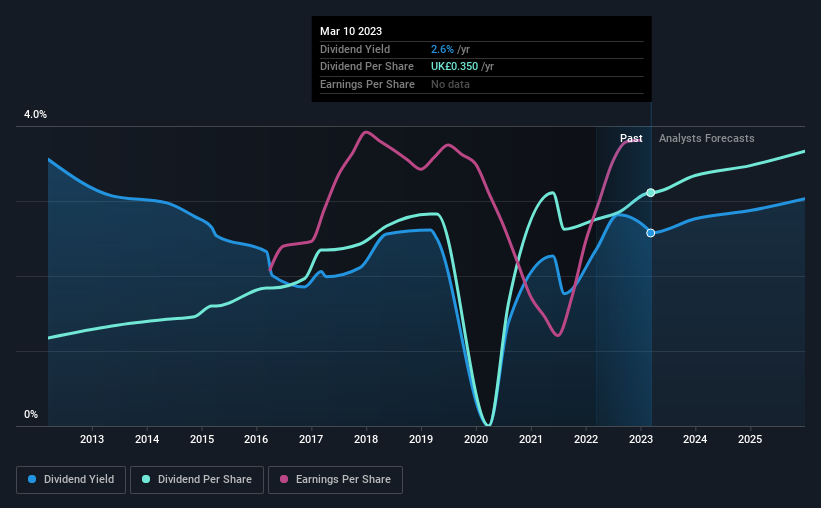- United Kingdom
- /
- Metals and Mining
- /
- LSE:HILS
Hill & Smith (LON:HILS) Is Increasing Its Dividend To £0.22
Hill & Smith PLC (LON:HILS) has announced that it will be increasing its dividend from last year's comparable payment on the 7th of July to £0.22. Even though the dividend went up, the yield is still quite low at only 2.6%.
Check out our latest analysis for Hill & Smith
Hill & Smith's Payment Has Solid Earnings Coverage
If it is predictable over a long period, even low dividend yields can be attractive. Prior to this announcement, Hill & Smith's dividend was only 52% of earnings, however it was paying out 98% of free cash flows. While the company may be more focused on returning cash to shareholders than growing the business at this time, we think that a cash payout ratio this high might expose the dividend to being cut if the business ran into some challenges.
Over the next year, EPS is forecast to expand by 45.7%. Assuming the dividend continues along recent trends, we think the payout ratio could be 37% by next year, which is in a pretty sustainable range.

Dividend Volatility
The company has a long dividend track record, but it doesn't look great with cuts in the past. The annual payment during the last 10 years was £0.132 in 2013, and the most recent fiscal year payment was £0.35. This implies that the company grew its distributions at a yearly rate of about 10% over that duration. It is great to see strong growth in the dividend payments, but cuts are concerning as it may indicate the payout policy is too ambitious.
Hill & Smith May Find It Hard To Grow The Dividend
Given that the dividend has been cut in the past, we need to check if earnings are growing and if that might lead to stronger dividends in the future. Although it's important to note that Hill & Smith's earnings per share has basically not grown from where it was five years ago, which could erode the purchasing power of the dividend over time.
The Dividend Could Prove To Be Unreliable
Overall, this is probably not a great income stock, even though the dividend is being raised at the moment. While Hill & Smith is earning enough to cover the payments, the cash flows are lacking. We would probably look elsewhere for an income investment.
Companies possessing a stable dividend policy will likely enjoy greater investor interest than those suffering from a more inconsistent approach. However, there are other things to consider for investors when analysing stock performance. For example, we've picked out 1 warning sign for Hill & Smith that investors should know about before committing capital to this stock. If you are a dividend investor, you might also want to look at our curated list of high yield dividend stocks.
Valuation is complex, but we're here to simplify it.
Discover if Hill & Smith might be undervalued or overvalued with our detailed analysis, featuring fair value estimates, potential risks, dividends, insider trades, and its financial condition.
Access Free AnalysisHave feedback on this article? Concerned about the content? Get in touch with us directly. Alternatively, email editorial-team (at) simplywallst.com.
This article by Simply Wall St is general in nature. We provide commentary based on historical data and analyst forecasts only using an unbiased methodology and our articles are not intended to be financial advice. It does not constitute a recommendation to buy or sell any stock, and does not take account of your objectives, or your financial situation. We aim to bring you long-term focused analysis driven by fundamental data. Note that our analysis may not factor in the latest price-sensitive company announcements or qualitative material. Simply Wall St has no position in any stocks mentioned.
About LSE:HILS
Hill & Smith
Manufactures and supplies infrastructure products in the United Kingdom, rest of Europe, North America, the Middle East, rest of Asia, and internationally.
Flawless balance sheet average dividend payer.
Market Insights
Community Narratives



